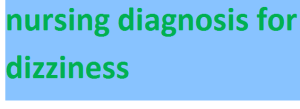nursing diagnosis for dizziness 2024-2025
nursing diagnosis for dizziness 2024-2025

Vertigo is different from dizziness, which is the third most common reason people seek medical attention. Vertigo typically includes disorientation in addition to the potential for both unsteadiness and faintness. Both conditions may persist to the point where they become incapacitating.
There are numerous causes of dizziness. The most common cause of dizziness that affects air flow to the head or ears is infection in the viral system. Due to reduced blood flow to the brain, low blood pressure can also cause dizziness. Anxiety and panic attacks can make you feel dizzy. Another possibility is sudden low blood sugar, which can be easily treated by eating sugary foods.
The following symptoms can be used to identify the dizziness:
- being overcome with emotion or fainting at the sight of blood
- Having a hard time standing up or staying still for too long
- Weakness during a illness
- Seasickness or motion sickness
- Queasiness, nausea, or vomiting
- Confusion in thinking
- Fatigue feelings, tiredness or daytime sleepiness
- Clumsy movement
The semicircular canals of the ear’s equilibratory apparatus is typically the cause of vertigo. The vestibule, the eighth nerve, the semicircular canals, the eyes, and the brainstem may also be affected. A wide range of conditions and diseases can affect any of these structures, including: osteosclerosis, labyrinthitis, otitis media, and an obstruction of the external auditory canal or Eustachian tube. Meniere’s syndrome, a disease that can cause vertigo, is a very important factor.
related to: stress and tension, irritation/nerve pressure, increased intracranial
exemplified by: states of pain that are influenced by things like shifting positions, disrupting sleep patterns, and anxiety.
2. Ineffective individual coping
relevant to: inadequate relaxation, inadequate coping strategies, and excessive workload
3. Deficient knowledge : (needs to learn) about the condition and treatment needs
relevant to: Cognitive limitations include difficulty remembering unfamiliar information.
characterized by the information requested, inadequate follow-through
Click here for South African Nursing Colleges and Schools Application 2023-2024
RELATED LINKS
Nursing Online Application links